Zirconium
Zirconium Implants: Biocompatible and Aesthetic Dental Solutions
For patients experiencing tooth loss, dental implants are one of the most permanent and natural-looking treatment options available today. While titanium has long been the traditional material of choice, zirconium implants have been gaining popularity due to their metal-free structure and high biocompatibility.
At LHC Klinik, we offer cutting-edge zirconium implant treatments that provide both aesthetic appeal and long-term health benefits. So, what are zirconium implants, how are they applied, and what makes them a preferred alternative? Let’s explore.
What Are Zirconium Implants?
🦷 Zirconium Implants
Zirconium implants are dental implants made from zirconia ceramic, a completely metal-free and durable material. Unlike traditional titanium implants, zirconium implants are white in color, making them the closest match to natural teeth in appearance. Their strength and tissue-friendly composition make them ideal for patients with metal allergies or high aesthetic concerns.
Zirconia has been used in dentistry for many years, especially in crowns and prosthetics. Its integration into implant technology marks a significant advancement in both biocompatibility and cosmetic results.
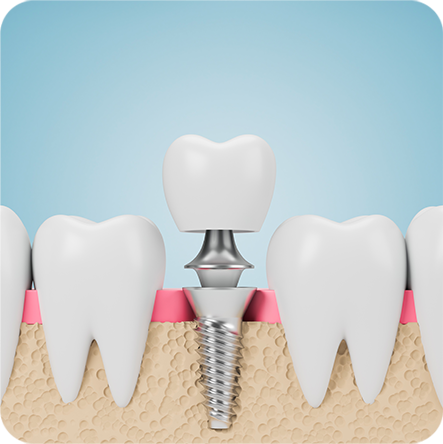

Who Is a Candidate for Zirconium Implants?
🦷 Zirconium Implants Suitability
Zirconium implants are suitable for individuals with good overall health and sufficient jawbone volume. They are particularly recommended in the following cases:
- Patients with metal allergies
- Individuals seeking aesthetic improvements, especially for front teeth
- Patients with sensitive gums or prone to inflammation
- Anyone with a healthy jawbone structure
Prior to treatment, a thorough dental examination is conducted to determine the best approach for each individual.
How Are Zirconium Implants Applied?
🦷 Zirconium Implants Application Process
The application process for zirconium implants is quite similar to titanium implants and includes the following steps:
- Examination and Planning:
- A full oral assessment is performed, including panoramic X-rays or 3D imaging to evaluate bone density and suitability.
- Surgical Placement:
- Under local anesthesia, a small hole is created in the jawbone, and the zirconium implant is placed.
- The procedure usually takes 30–60 minutes and is minimally invasive.
- Healing Phase (Osseointegration):
- A healing period of 3 to 6 months allows the implant to integrate with the jawbone, forming a strong and stable foundation.
- Final Prosthesis Placement:
- After healing, a custom-made zirconium crown is placed onto the implant, restoring both function and aesthetics.
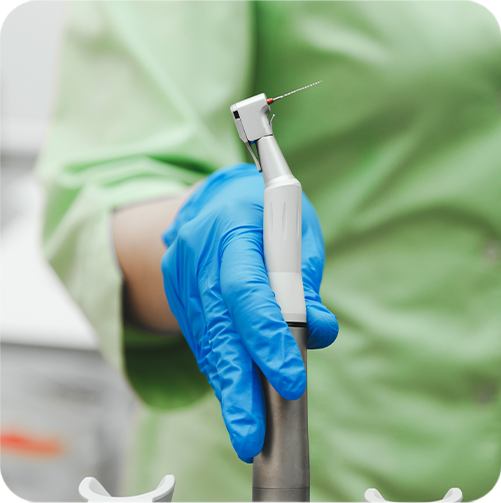
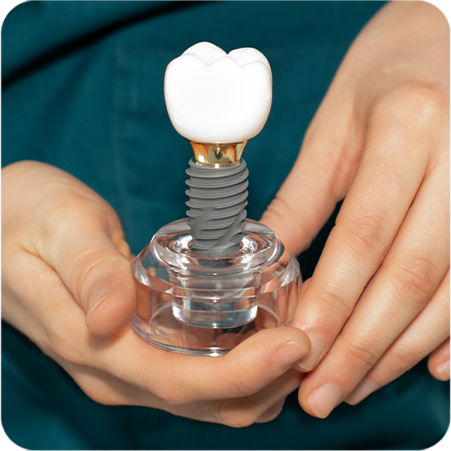
Advantages of Zirconium Implants
🦷 Advantages of Zirconium Implants
- ✔️ Metal-Free Structure:
- A safe alternative for patients with titanium or other metal allergies.
- ✔️ Natural Tooth Appearance:
- White color closely mimics natural teeth.
- Especially advantageous for visible areas like front teeth.
- ✔️ High Biocompatibility:
- Minimizes inflammation and supports gum health.
- Promotes excellent integration with surrounding tissues.
- ✔️ Strong and Durable:
- Highly resistant to wear, pressure, and breakage.
- ✔️ Low Plaque Accumulation:
- Smooth surface prevents bacterial buildup, improving oral hygiene.
- ✔️ Excellent Bone Compatibility:
- Promotes long-term stability and bone preservation.
Are There Any Disadvantages?
⚠️ Limitations of Zirconium Implants
- • More Fragile Than Titanium:
- Slightly higher risk of fracture under excessive force or pressure.
- • Higher Cost:
- Due to production methods and material expenses, zirconium implants can be more expensive than titanium alternatives.
- • Not Ideal for All Cases:
- In full-arch restorations or complex surgeries, titanium implants may still be preferred.
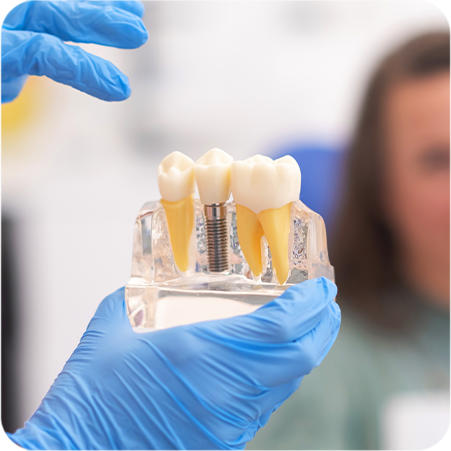
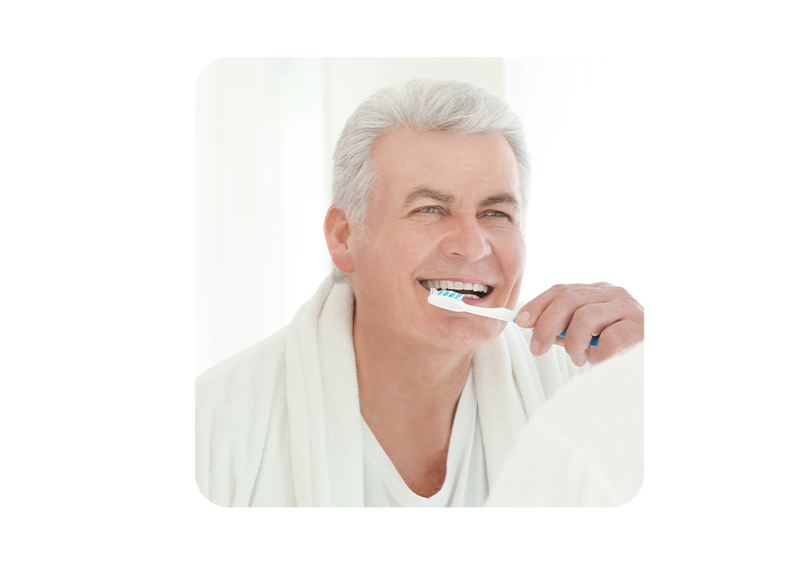
Post-Treatment Care Tips - Zirconium Implants
✔️ Post-Operative Care for Zirconium Implants
- Eat soft foods for the first few days and avoid extreme temperatures.
- Follow your dentist’s medication and care instructions.
- Maintain regular oral hygiene with a soft toothbrush and appropriate flossing.
- Attend regular dental checkups every 6 months.
Why Choose LHC Klinik? - Zirconium Implants
At LHC Klinik, we provide advanced implant solutions tailored to each patient’s unique needs. Our experienced dental team uses the latest diagnostic tools and biocompatible materials to ensure successful and aesthetically pleasing results.
📍 Whether you’re allergic to metals or simply want the most natural-looking implant solution, zirconium implants at LHC Klinik may be the right choice for you.
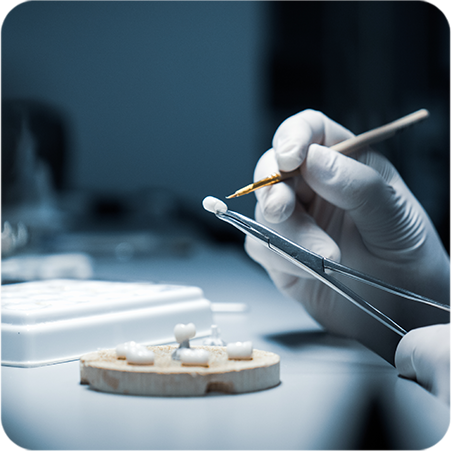

Conclusion: A Natural and Healthy Smile Is Within Reach
Zirconium implants are a breakthrough in modern dental care, offering a powerful alternative to titanium for patients who prioritize both aesthetics and health. Especially ideal for those with metal sensitivities or front-tooth restorations, these implants combine beauty with biocompatibility.
Schedule a consultation with your dentist at LHC Klinik today to find out if zirconium implants are the right fit for your smile transformation.
Frequently Asked Questions
A healthy smile starts with a disciplined oral care routine. This routine should include:
• Brushing twice daily with a soft-bristled toothbrush and fluoride toothpaste
• Flossing once a day to remove plaque and food debris between teeth• Rinsing with an antibacterial mouthwash for added freshness and protection against
plaque
• Replacing your toothbrush every 3 months or sooner if the bristles are worn
Additionally, limiting sugary snacks and acidic drinks, staying hydrated, and attending
regular dental check-ups contribute to long-term oral health.
Why Are Color, Shape, and Symmetry Harmony Important in Dental Aesthetics? In smile design, achieving harmony in color, shape, and symmetry is key to creating a natural, balanced appearance. Discrepancies can make even healthy teeth look unattractive. Factors considered: • Matching the veneers or crowns to the natural tooth color and shape • Ensuring proportionate tooth sizes relative to facial features • Aligning teeth for overall symmetry This careful planning ensures the smile enhances the patient’s overall facial aesthetics.
Bone grafting restores bone in areas where it's lost due to tooth extraction, gum disease, or
trauma.Types of bone grafts include:
• Synthetic materials
• Donor or patient’s own bone (autograft)
Bone grafting supports future dental implant placement or maintains facial structure.
Missing teeth can lead to:
• Shifting of adjacent teeth, causing bite problems
• Bone loss in the jaw over time
• Speech difficulties and chewing inefficiency
• Psychological effects, such as lowered self-esteem
Timely replacement with suitable dental prostheses can prevent these complications.
A night guard is a custom-made device worn over teeth at night to: • Prevent tooth damage from grinding or clenching • Alleviate jaw tension and headaches related to bruxism Individuals with teeth grinding, jaw pain, or those who have had restorative dental work are often advised to use a night guard.
